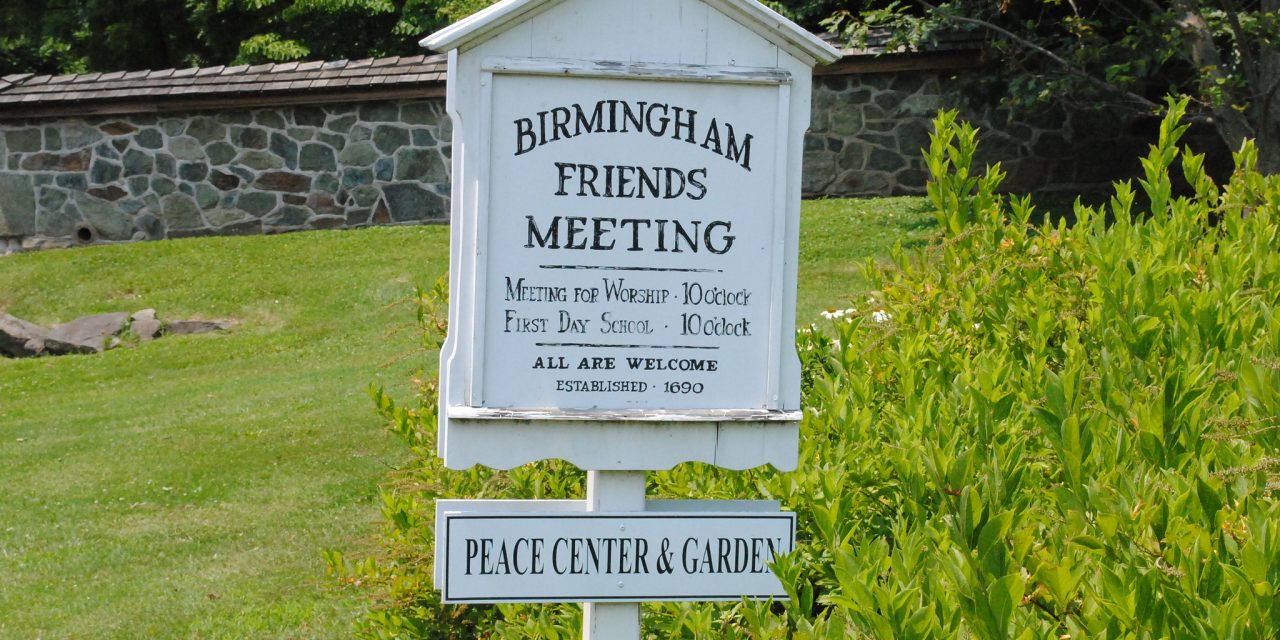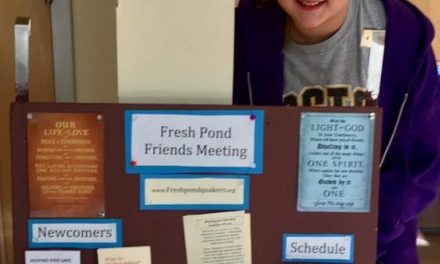We (like many religious groups) often put the phrase “all are welcome” on our signs. We need to make sure we’re being truthful, though. Is everyone really welcome?
Accessibility
Are disabled people welcome in your congregation?
In the United States, religious organizations are exempt from the Americans with Disabilities Act. On top of that, the ADA allows a lot of grandfathering of inaccessible facilities. If you bought your meetinghouse from another organization that lacked that exemption, it still might not be accessible.
When looking for a meeting space, a Friend I know told her meeting “if it’s not accessible, we have to take down the ‘all are welcome’ sign.”
Queries:
- Can a wheelchair driver get into the worship space?
- Can a wheelchair driver get from the worship space to after-worship refreshments?
- Will a wheelchair get through the bathroom door and maneuver inside the bathroom? Are there grab-rails so the driver can shift to the toilet?
- Do you have technology to assist Hard of Hearing and Deaf people? Are the batteries charged? Can they find it?
- Bonus: do you have ASL interpretation available?
- How are the acoustics in your worship space? Echoes will mess with hearing aids and microphones.
- Is your website accessible?
- How would you respond to a child or adult with a developmental delay?
- How would you respond to someone dealing with mental illness?
Cultural Norms
Race
Martin Luther King Jr once famously said Sunday morning is the most segregated time in America. Most Friends meetings and churches have a dominant racial group. In most of the United States, that’s white people. Even in areas of the US with significant populations of people of color, Friends congregations tend to be whiter than the neighborhood.
This isn’t an invitation to simply say “we’re not racist” and move on. Instead, really think about the norms in your congregation. In any group of people who have a lot in common, there’ll be some set of expectations. Being welcoming requires recognizing the way “what we’re used to” and “what’s objectively correct” are not the same thing.
Damn near everything that Black people do is already outside the white norm. Black people talk too loud, they don’t do what they’re told, they “act out,” they stand too close, they have weird hair, they dress funny, they shake their butts too much (which is fine if Taylor Swift does it).
When a white person says “It’s not about race,” they are pretty much always saying it when a Black person, or a Latino person, or a Muslim person is not acting the way a white European would act or wants them to act.
—John Metta, in It’s Not About Race!
Class
Class is another thing to be aware of. If your meeting is largely middle/upper middle/upper class, you may have certain assumptions. “Oh, where did you go to college?” Only one third of US adults have a bachelors degree. The rest may be put off by this question. Try not to sound shocked when told someone has no plans to pursue a masters degree (yeah, been there).
Saying things like “we don’t tend to have much money since so many of us go into low-paying careers like social worker and teaching” also reveals a certain lack of perspective. For the record, in the US, social workers individually earn nearly the median annual household income. Starting salary for teachers is midway between median individual and median household incomes, while average salary for teachers overall is the median annual household income. These are middle class jobs. Count your blessings.
And for Pete’s sake, don’t just assume every blue collar person who walks through your door belongs on the facilities/maintenance/etc. committee.
Queries:
- If someone who doesn’t look or speak like most of you walks in, will they feel welcome?
- How tightly do you hold your expectations of behavior? How important to the practice of your faith are those expectations of behavior? Could they be held more loosely?
- Can you have conversations with someone of a different ethnic background than you without making it awkward?
- If your neighborhood has a mix of languages, do you have someone capable of translating?
- Are your website and handouts written at an accessible reading level?
- Do you have a sense of perspective about the range of incomes and lifestyles found in your city?
LGBTQ Community
Quakers do not have full agreement regarding LGBTQ inclusion. For some, this section will be easier than others.
If you intend to be welcoming toward the LGBTQ community, it helps to make that obvious. Don’t leave people guessing on whether they should or should not walk through your door. If they have to guess, they’ll probably guess “don’t bother.” Be upfront on your website. Perhaps have a rainbow flag on the outside of your meetinghouse.
It’s a good idea to put a space for pronouns on name badges, if you want transgender and genderqueer people to feel welcome. It indicates that you care about using the correct pronoun. Ensure that you do, in fact, care to use the pronoun they list.
Queries:
- Would a woman married to another woman feel welcome? What about a man dating another man?
- Can a non-binary person or someone visibly transgender easily find a safe bathroom to use?
- Would the guest’s pronouns be respected?
- Would people in the trans umbrella be singled out as the only ones writing pronouns on their name badges, or do cis people do that too?
- Are members of the LGBTQ community allowed to serve in positions of eldership (such as Ministry & Worship committee)? In paid staff positions? Do you have restrictions on their ability to be in a relationship?
Families with Children
Open worship can be very difficult for children. If you expect children in silent/waiting/open/unprogrammed worship, that means accepting that they will move around and make noise. If someone gives a parent “the look,” they’ll be embarrassed. They might not come back.
If the kid is bored to tears, the family might not come back either. If you don’t have a children’s program yet, consider starting one. At least have quiet activities (such as coloring) available for kids to do during worship. Even if you have no children in your meeting now, you should have a plan in place. Nothing makes a guest feel more unwelcome than discovering nobody ever even thought about them.
Queries:
- Do you welcome the sounds (and sights) of children in worship?
- Do you involve parents and children in the life of the meeting?
- Does your website make it clear what parents should expect?
Header photo by Lee Cannon via Flickr, under CC-BY-SA license






Recent Comments